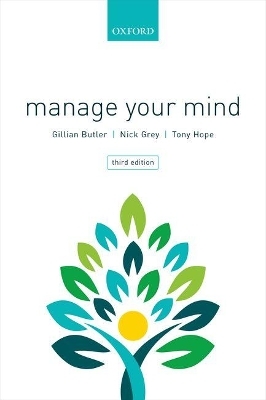
Manage Your Mind
Oxford University Press (Verlag)
978-0-19-874727-7 (ISBN)
Manage Your Mind is a book for building resilience, overcoming emotional difficulties and enabling self-development. It is for any of us who wish to understand ourselves better, to be more effective in day-to-day life, or to overcome current problems; or who want to support others in these tasks. The authors have, between them, almost 100 years of experience of helping people through difficult times. This experience, together with the results from scientific research, leads to Manage Your Mind distilling effective techniques and ideas so that readers can select those that suit their preferences and needs. The book explains and illustrates how to respond skilfully to life's challenges.
The first part of the book helps us gain a better understanding of ourselves and provides tools for clarifying what we most value in life. It highlights the benefits of the practice of acceptance and kindness, and shows how to build self-esteem and self-confidence.
The second part of the book presents practical tools and methods for making our way in the world that are relevant to everyone. This includes the importance of perspective and how we can best use our thinking skills. It also covers everyday topics such as the value of useful habits, time management, looking after our physical health, and increasing happiness, well-being and creativity. The final section focuses on how to develop and maintain good relationships.
The third part of the book provides evidence-based approaches to overcoming specific emotional difficulties, such as worry, panic, low mood, anger, addictions, and coping with trauma, loss and chronic ill health.
With well over 200,000 copies sold, Manage Your Mind remains the definitive self-help guide for anyone seeking to lead a more fulfilling and productive life.
Gillian qualified as a clinical psychologist in 1976. Her work in Oxford University Department of Psychiatry helped to develop and evaluate cognitive-behavioural treatments for anxiety disorders. Later in the NHS she focused on extending these methods for helping people who suffered traumatic experiences during childhood. She has now retired from clinical practice, but continues to run training workshops and to make the products of research generally available through her writing. Her books include Overcoming Social Anxiety and Shyness, and Psychology: A Very Short Introduction (co-authored with Freda McManus). Nick qualified as a clinical psychologist in 1996. His clinical work focuses on CBT for adults with PTSD and anxiety disorders. He is a member of the Wellcome Trust Anxiety Disorders Group further developing and disseminating cognitive therapy treatments. He is accredited with the British Association of Behavioural and Cognitive Psychotherapies as a practitioner, supervisor and trainer, and is a Fellow of the BABCP. He is the editor of A Casebook of Cognitive Therapy for Traumatic Stress Reactions and co-editor with Adrian Whittington of How to be a More Effective CBT Therapist. Tony's first degree was in philosophy and physiology. He carried out research in brain science for a PhD and then became a doctor specialising in psychiatry. He combined clinical work with research and teaching and co-authored the best-selling medical textbook: The Oxford Handbook of Clinical Medicine. In mid-career he became one of the pioneers in developing teaching in ethics for medical students and founded The Ethox Centre at the University of Oxford: a centre for research and teaching in clinical ethics. He was the first Professor of Medical Ethics at Oxford. He continued to work clinically in cognitive-behaviour therapy until his retirement in 2012.
Part I: Making sense 1: The scientific background: knowing what works 2: Valuing and understanding yourself 3: The value and practice of acceptance 4: The value and practice of kindness 5: Building self-esteem and self-confidencePart II: Making your waySection 1: Thinking well 6: Taking a positive approach 7: Finding new perspectives 8: Using your head: thinking and decidingSection 2: Creating a framework 9: Developing useful habits 10: Goals and how to use them 11: Using time well 12: Keeping physically wellSection 3: Being happy 13: Increasing the chance of happiness 14: Treating yourself right 15: Becoming more creativeSection 4: Making your way with others 16: Good relationships: the principles 17: Assertiveness 18: Negotiation skills 19: Understanding voices from your pastPart III: Overcoming difficultiesSection 5: Preparing to tackle difficulties 20: Recognising that you can change: facing problems 21: Problem-solving: a strategy for change 22: Stress: balancing life's demandsSection 6: Anxiety 23: Getting the better of worry: defeating the alarmist 24: Overcoming fears and avoidance: social anxiety and phobias 25: Dealing with panicSection 7: Low mood and anger 26: Depression: the common cold of the mind 27: Digging yourself out of depression 28: Feeling angry and keeping calmSection 8: Trauma and Loss 29: Loss and bereavement 30: Stepping away from the past 31: Recent traumatic events and their aftermathSection 9: Enduring physical difficulties 32: Chronic ill health 33: Breaking habits and overcoming addictionsOnline Only Material Some common defense mechanisms that impede understanding What kind of coach do you want to be? The mental crusher The Zeigarnik effect Blank Thought Records and Key Questions to go with them Alternatives diary blank form and key questions to go with it Aspects of personality to consider when developing new habits Planning your goal The Zeigarnik effect The David Allen approach Blank pie chart Relaxation Responding in a mature way to common voices of the Child Responding in a mature way to common voices of the Parent Worry-Outcome Diary Relaxation Developing confiding relationships to reduce your chance of depression Diary of daily activities Developing confiding relationships to reduce your chance of depression Blank Thought Records and Key Questions to go with them The legacy of being bullied Ground yourself in the here and now Habit monitoring record Stopping smoking Averting problems with alcohol
| Erscheinungsdatum | 15.12.2017 |
|---|---|
| Verlagsort | Oxford |
| Sprache | englisch |
| Maße | 174 x 247 mm |
| Gewicht | 1140 g |
| Themenwelt | Sachbuch/Ratgeber ► Gesundheit / Leben / Psychologie ► Psychologie |
| Geisteswissenschaften ► Psychologie ► Psychoanalyse / Tiefenpsychologie | |
| Medizin / Pharmazie ► Medizinische Fachgebiete ► Psychiatrie / Psychotherapie | |
| ISBN-10 | 0-19-874727-6 / 0198747276 |
| ISBN-13 | 978-0-19-874727-7 / 9780198747277 |
| Zustand | Neuware |
| Haben Sie eine Frage zum Produkt? |
aus dem Bereich


